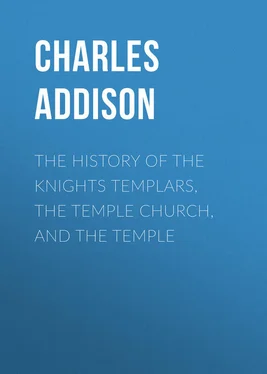Morant’s hist. Essex, Rymer. tom. iii. p. 290 to 294.
Redditus omnium ecclesiarum et molendinorum et terrarum de bailliâ de Lincolnscire. Inquis. terrar. ut sup. fol. 41 b to 48 b and 49 a. Peck’s MS. in Museo Britannico, vol. iv. fol. 95 et seq.
Peck’s MS. ut sup. fol. 95.
Inquis. ut. sup. 58 b to 65 b.
Inquis. terrar. ut sup. fol. 12 a to 23 a. Dodsworth MS. vol. xx. p. 65, 67, ex quodam rotulo tangente terras Templariorum. Rot. 42, 46, p. 964. Dugd. Baron. tom. i. p. 70.
Monast. Angl. ut sup. p. 840. Hasted. hist. Kent.
Ex cod. MS. in officio armorum, L. xvii. fol. 141 a. Calendarium Inquis. post mortem, p. 13. 18.
Manning’s Surrey. Atkyn’s Gloucestershire; and see the references in Tanner. Nash’s Worcestershire.
Bridge’s Northamptonshire, vol. ii. p. 100.
Thoroton’s Nottinghamshire. Burn and Nicholson’s Westmoreland. Worsley’s Isle of Wight.
Habuerunt insuper Templarii in Christianitate novem millia maneriorum … præter emolumenta et varios proventus ex fraternitatibus et prædicationibus provenientes, et per privilegia sua accrescentes. Mat. Par. p. 615, ed. Lond. 1640.
Amplis autem possessionibus tam citra mare quam ultra ditati sunt in immensum, villas, civitates et oppida, ex quibus certam pecuniæ summam, pro defensione Terræ Sanctæ, summo eorum magistro cujus sedes principalis erat in Jerusalem, mittunt annuatim. — Jac. de Vitr. Hist. Hierosol. p. 1084.
Masculum pullum, si natus sit super terram domus, vendere non possunt sine licentiâ fratrum. Si filiam habent, dare non possunt sine licentiâ fratrum. Inquisitio terrarum, ut supr. fol. 18 a.
The Templars, by diverting the water, created a great nuisance. In A. D. 1290, the Prior et fratres de Carmelo (the white friars) complained to the king in parliament of the putrid exhalations arising from the Fleet river, which were so powerful as to overcome all the frankincense burnt at their altar during divine service, and had occasioned the deaths of many of their brethren. They beg that the stench may be removed, lest they also should perish. The Friars preachers (black friars) and the bishop of Salisbury (whose house stood in Salisbury-court) made a similar complaint; as did also Henry Lacy, Earl of Lincoln, who alleges that the Templars ( ipsi de novo Templo ) had turned off the water of the river to their mills at Castle Baignard. — Rot. Parl. vol. i. p. 60, 200.
Ex cod. MS. in officio armorum, L. xvii. fol. 141 a. Dugd. Monast. Angl. ut sup. p. 838. Tanner , Notit. Monast.
Dugd. Baronage. Monast. Angl. p. 800 to 844.
Power to hold courts;
to impose and levy fines and amerciaments upon their tenants;
to buy and sell, or to hold a kind of market;
to judge and punish their villains and vassals;
to try thieves and malefactors belonging to their manors, and taken within the precincts thereof;
to judge foreign thieves taken within the said manors, &c.
Cart. 11. Hen. 3. M. 33. Dugd. Monast. p. 844.
Acta Rymeri , tom. i. p. 54, 298, 574, 575.
Page 431.
13 Edward I.
2 Inst. p. 432.
2 Inst. p. 465.
Stat. Westr. 2, cap. 43, 13 Ed. I.
The title Master of the Temple was so generally applied to the superiors of the western provinces, that we find in the Greek of the lower empire, the words Τέμπλου Μαιστὼρ. Ducange. Gloss.












